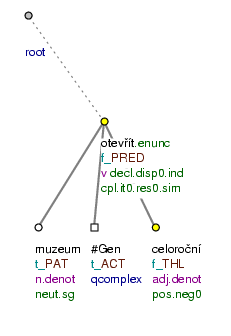- Definition of the
THLfunctor -
The
THLfunctor (temporal: how long) is a functor for such a a free modification that provides specification of time as if answering the question "how long?" (the length of the duration of the event expressed by the governing word), or "after how long?" (the interval within which the event comes to its end).
THL modifications are usually expressed by direct specification of time (Četl půl hodiny. (=He was reading for half an hour.); Napsal to za dvě hodiny. (=He wrote it in two hours.) ), it is usually not expressed by specifying the relation to another event (po dobu konání přednášky (=for the time of the lecture)).
The two possible questions defining the THL modification are two contextual variants of the same meaning, which are related to the aspect of the governing verb. The variant "how long" mostly coocurs with the imperfective aspect (Četl půl hodiny. (=He was reading for half an hour.)), while the variant "after how long" is primarily connected with perfective aspect (Přečetl to za půl hodiny. (=He read it in half an hour.)).
Forms. The basic forms of THL modifications are:
-
prepositional phrase.
The most common forms:
po+4 Dělal to po tři léta. (=He did it for three years.) po dobu+2 Po dobu nemoci nepracoval. (=For the time of illness he did not work.) přes+4 Vydražitel už přes měsíc čeká na předání zaplaceného majetku. (=The auction acquirer has been waiting for the handover of the paid property for more than a month.) za+4 Napsal to za dvě hodiny. (=He wrote it in two hours.) -
noun in a non-prepositional case.
The most common forms:
accusative Psal ten úkol dvě hodiny. (=He was writing the homework for two hours.) -
adverbial expressions.
Examples:
Muzeum je otevřeno celoročně.
THL(=lit. (The) museum is open all_year_round.) Fig. 7.13Dlouho.
THLse neviděli. (=lit. (For)(a) long_time each_other (they) have_not_seen.)Spor se táhne donekonečna.
THL(=lit.(The) dispute - goes forever.)Ještě.
THLprší. (=lit. Still (it) is_raining.)Ustanovení platí i nadále.
THL(=lit.(The) enactment is_valid also from_now_on.)Nepřetržitě.
THLvysílali. (=lit. Constantly (they) broadcast.)Denně pracuje přesčas.
THL(=lit. Daily (he) works overtime.)Usadil se tam trvale.
THL(=lit. (He) settled - there forever.)Ustavičně.
THLpršelo. (=lit. Incessantly (it) rained.)Je věčně.
THLnespokojený. (=lit. (He) is always dissatisfied.)Akcie českých podniků jsou stále.
THLvysoce nadhodnoceny.(=lit.(The) shares (of) czech enterprises are still highly overestimated.) -
dependent clause.
The most common forms:
dokud Pracoval, dokud měl síly. (=He worked as long as he had strength for it.) pokud Pracoval, pokud měl síly. (=He worked if he had strength for it.) NB! A similar meaning can be also expressed by a dependent clause modifying a noun (its effective root node is assigned the
RSTRfunctor); e.g.:Za tu krátkou dobu.
THL, co jsem studoval.RSTRv zahraničí, jsem se naučil více než na všech školách doma . (=lit. During that short time when (I) - studied - abroad (I) - learnt more than at all schools at_home.)
Agreeing form of an adjective. With nouns referring to events (nouns ending with -ní and tí; see Section 2.4.3.3, "Functors assigned to the non-valency modifications of nouns referring to events"), the THL modifications can also be expressed by agreeing form of adjectives.
Examples:
třičtvrtěhodinové.THL vystoupení (=lit. (a) three-quarter-hour performance)
dvouleté.THL redaktorské působení v Lidové obrodě (=lit. (a) two-year editorial activity in Lidová obroda)
trvalé.THL rozhodování (=lit. permanent decision)
Figure 7.13. The THL functor

Muzeum je otevřeno celoročně. (=lit. (The) museum is open all_year_round.)
Border with the TWHEN functor. In the cases in which the meaning "how long?" or "after how long?" is superimposed upon the basic meaning "when?", the THL functor borders on the TWHEN functor (see Section 3.1, "TWHEN"). If the meaning "how long?"or "after how long?" follows directly from the temporal modification, the modification is assigned the THL functor. However, if the meaning "how long?" or "after how long?" follows from something else (e.g. from the context, verbal aspect etc.), the modification is usually assigned the TWHEN functor. Cf.:
-
Pracoval celou neděli.
THL(=lit. (He) worked all Sunday.)The modification celou neděli (=lit. all Sunday) expresses both temporal localization of the event (answer to the question "when?"), and the meaning "how long?". The modification will be assigned functor
THL.
Border with the TTILL functor. The THL functor borders on the temporal meaning "till when?" (the TTILL functor; see Section 3.9, "TTILL"). The THL functor, however, expresses primarily the length of an event (finished or not), while the TTILL functor expresses primarily the end of an event regardless of its length. Cf.:
-
Do posledního okamžiku.
TTILLjsem věřil, že se to povede. (=lit. Till (the) last moment (I) - believed that - it will_turn_out_well.)The modification do posledního okamžiku (=till the last moment) can answer the question "till when?" (
TTILL), but it can also mean "how long?" (THL). In such cases theTTILLfunctor is preferred.
Dependent clause introduced by the connective "dokud (=till/until)". Dependent clauses introduced by the connective dokud (=till/until) can express not only the meaning of the THL functor but also the meaning of the TTILL functor (see Section 3.9, "TTILL"). The effective root node of the dependent clause is assigned the TTILL functor especially in those cases when it represents a negative perfective verb. If the effective root node of the dependent clause represents a positive verb form, it is usually assigned the THL functor. Cf.:
-
Dokud budu.
THLživ, budu na vás vzpomínat. (=lit. As_long_as (I) - live, (I) will - you remember.) -
Nedělej to, dokud se nevrátím.
TTILL(=lit. Don't_do it till (I) - come_back.)